Metropolitan Daniel of Archangelsk and Kholmogorsk spoke to us about the proper relationship between Church and society, about what to say in response to criticism/condemnation of priests, about the Church's mission today, about patience, and about what to do to put an end to excessive drinking in the villages.
Metropolitan Daniel gave me such detailed direction—turn right upon exiting the last car, then another right, then left at the passageway—that the thought kept running through my mind throughout the journey: Does the Metropolitan of Archangelsk and Kholmogorsk actually travel about Moscow by Metro? As instructed, on arriving at the designated house, I once again telephoned the Metropolitan. Over the phone, a voice joyously exclaimed, “I can see you!” I look up and see, framed by a lighted window, a tall person dressed in black, who is waving enthusiastically. 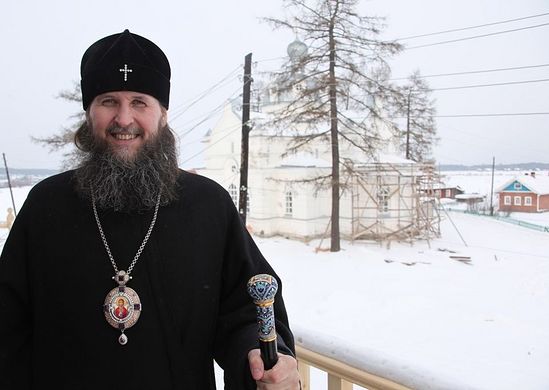
Metropolitan Daniel of Archangelsk and Kholmogorsk. All photos: Press Service of the Archangelsk and Kholmogorsk Diocese.
When you talk to him—even over the phone—it is as if you have finally located a very close relative, from whom for some reason you have been separated for years. People say of Metropolitan Daniel that he is a man without affectations, that at any given moment, any priest of his enormous metropolia can meet with him, that he is quick off the mark, traveling about his diocese and meeting with the people. Still, I asked him about the Metro. While pouring enormous cups of tea, the hierarch answered “In Moscow you have such traffic jams, that I sometimes ride the Metro, and even enjoy doing so. Today, in his recently-formed Metropolia, church life is in full swing, possibly more active than anywhere else.
* * *
— Your Grace, today many Orthodox people feel the need to become involved with what is happening all around us. First of all, how should we become involved? Through prayer, or through public expression? 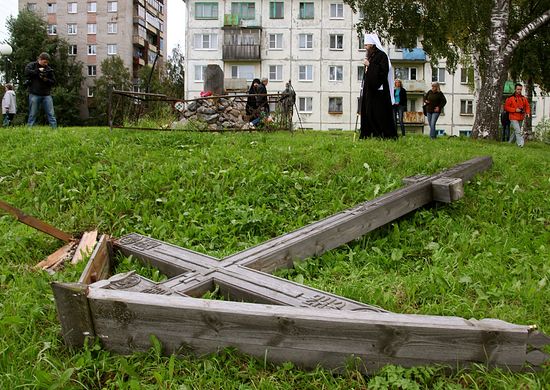
August 25, 2012, Cross cut down in Archangelsk.
— Both. We must both pray and express ourselves when it concerns our faith, our activities in life, the upbringing of the next generation—when it affects the morality of our people. After all, today we have access to the mass media, the internet. And of course, we should express our activism.
Often you get the impression that the internet has been taken over by people who have no more than a sixth grade education, who have learned nothing, have dropped out of school, but nonetheless have begun to live on forums and internet mass media sites. But when someone piles abuse upon everyone, I have no interest in what he has to say, because he does not have God living in his soul. Another point: There are optimists, there are pessimists, and there are also whining complainers who pour out abuse upon the faith, upon our ecclesiastical authorities, and upon the entire country—for them everything is bad. If you read your fill of such things you will lose the desire to live any longer.
Of course, a Christian will talk about problems but his talk will be combined with hope for change. What we say is different from what non-believers say. Let us suppose that both they and we face some hopeless situation. We have the hope that if we ask, if we appeal to the Lord, He can help us. The non-believer has no one to turn to.
There exists an opinion that we have reached some “point of no return,” and that it is impossible for Russia to find its way out of a dead end. From the Soviet point of view, that really is the case, because it is impossible to save ourselves by our own efforts alone.
Do you remember the place in Divine Scripture when the Apostles were horrified to hear the Lord say: A rich man shall hardly enter into the kingdom of heaven (Mt. 19:23)? Elsewhere in Scripture we read: how hard is it for them that trust in riches to enter into the kingdom of God! (Mark 10:24).
And here is something that it is very important to understand. In Old Testament times, it was thought that if you had everything in abundance, if the Lord granted you all good things, it meant that you were pleasing to Him. Yet suddenly it turns out that for rich people, for those who apparently are pleasing to God, it is hard to enter into the Heavenly Kingdom. Naturally, the Apostles pose the question: who then can be saved?!
And the Lord answers: with men, this is impossible. By one's own efforts, it is impossible. But with God, all things are possible.
That is why a Christian is an eternal optimist. Always. Because he knows that the Lord rules over us.
However, everything we do on this earth must be done in peace. Take for example our hieromartyrs in the land of Archangelsk, where I now live. They departed in peace; in their last moments of life, they did not try to strangle their torturers.…
The same applies to speaking one's mind. It should not be done foaming at the mouth with anger. We should instead state our position eloquently and with dignity, presenting a concise argument. And we must state our position.
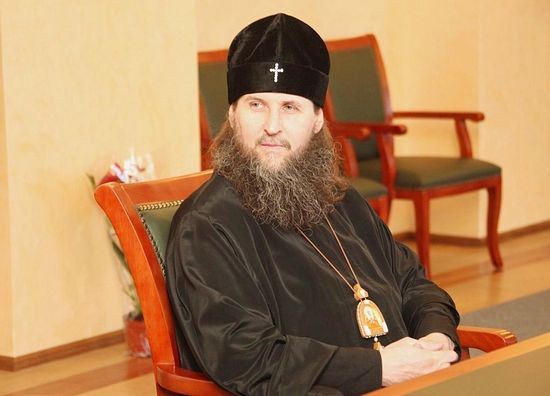 |
— My sister, a physician, told me of her and her colleague’s standard time limitations for seeing a patient: each one is allotted fifteen minutes. Within that brief span, the physician needs to listen to the complaint of grandmother complaint who has come to be examined, make a diagnosis and write a prescription, and then the patient must have time to leave the office. But in fact, by the time the patient has settled in, focused her thoughts, and set aside her crutch, fifteen minutes have already passed.
This is all because we have a critical shortage of doctors, and that is why our population is not very healthy.
But the situation in the religious sphere is even worse. There is a catastrophic shortage of clergy for such an enormous number of the faithful.
Of course, one would like to have clergy like those on the remarkable island of Sakhalin [From November 2001 to December 1012, Metropolitan Daniel was bishop of South Sakhalin and the Kuril Islands—Ed.] In that diocese, the church communities are small. Parishioners who have moved from the island to the mainland say, “We feel very uncomfortable in the churches of these big cities. The churches are older and the icon screens date from before the Revolution, but there are too many people, and it is impossible to get a chance to talk with the priest.”
The priest is like a doctor. He comes and serves a Moleben [supplicatory prayer service], but that is not enough. He should sit down and spend an hour or so with the people, have a cup of tea, talk and have fellowship with them. That is what they need. There are Divine Services, but there are not enough clergy to allow for a simple heart-to-heart talk. Yet often, just one such talk is enough to bring someone into the church.
It is also good to have fellowship with people outside the church grounds. It is easier to talk with people who have already come to church, but it is much more difficult to talk with people who have not yet starting coming. However, the fact that they have not yet come does not at all mean that they are opposed to the Church. You meet people somewhere, talk to them a bit, and after a while they begin to ask, “When do you serve? Can we come to see you?” At that point, ties are already being established.
That is how things should be. You simply have to battle for human souls—for each and every soul. This means that there have to be more priests, so that they might be able to freely have fellowship with the flock. We currently have a shortage of clergy, active laypeople, and missionaries, and we acutely feel that shortage.
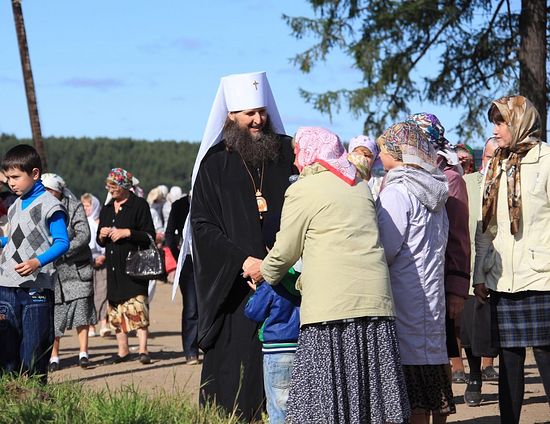 |
| During a visit to the Pinezhsk deanery. |
— That is quite simple. If a clergyman goes about the streets in his clerical garb—wearing a cassock and not “civilian” attire, he attracts people's attention. You are walking along the street, you are flying in an airplane, riding in a train, taking public transport, or fueling your car, and people can see you. They approach you and begin to ask questions. A conversation begins, and there you have an encounter... People like to say that it is a “chance” encounter. However, in fact nothing in life happens by chance.
I remember coming home on leave from my service in the army. I still had six months to serve, and I could not then have imagined that I would go to seminary. Such a thought had never entered my mind. However, my mother said to me, “You know, I have made the acquaintance of a remarkable priest. I told him about you, and he wants you to come visit. Let's go visit him!” “What, just go and visit him?” “Yes, let's simply go see him.”
That is to say, we did not meet in church. It was in the home of a clergyman that I had that encounter. We sat and talked. He made and served us tea. I don't remember how long I was with him, but it was a long time. I had taken up a lot of his time—something I realized only later—but he gave no indication that I was taking up his time. I decided that I wanted to be like that person.
You know how one of our hieromartyrs, the future Metropolitan Nestor (Anisimov) encountered St. John of Kronstadt? He met with him to ask him to pray for his sick mother. John of Kronstadt came to their home, healed his mother, and from that moment on the child wanted to become a clergyman. Later he became a priest, a bishop, and then a metropolitan. Finally he received a martyr's crown. That encounter with St. John of Kronstadt also took place not in church, but in a house.
Thus, for us, the whole world is a field for missionary activity.
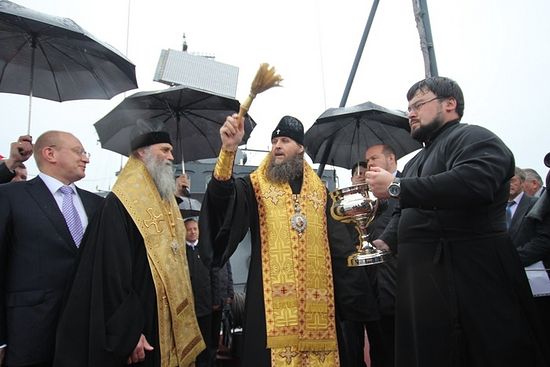 |
| Blessing of the ship “Naryan-Mar” by Metropolitan Daniel of Archangelsk and Kholmogorsk and Bishop Iakov of Naryan Mar and Mezensk, June 2012. |
— Sometimes, a person who expresses himself with hostility responds differently when he is answered peacefully. In my experience, there have been many such instances.
When it was my obedience to serve in Sakhalin, there was a woman occupying a rather important position there who constantly made unpleasant, heckling, mocking remarks. However, I understood that this was a defensive reaction: she was striving to somehow justify her not being in the Church. Up to that point, she had never entered God's temple. Why? Well, because she found a host of imperfections in us.
But after all, we are living people—a living community. The Church is a community of people who suffer from the same sicknesses that everyone else does. If the flu is rampant, it strikes everyone around. But if we see a doctor sniffling and taking pills do we say, “Ooooh! He himself is sick. I won't go to him...”? Of course not.
That is basically how I explained the situation to her. I said, “Why are you surprised? Open the Gospels and you will see that even among the twelve Apostles there was a Judas. And at the most critical moment, even Peter turned away from his Teacher and betrayed Him.
Not everyone would be prepared to forgive such a thing. Suppose a man betrays his wife, or a wife betrays her husband. Quite often, that causes the family to fall apart. “You betrayed me, you were unfaithful to me, and everyone knows all about it?! That's it; that is unforgiveable.”
Yet Peter publicly renounced the Lord, and the Lord forgave him! And He did not express His forgiveness by saying, “Well, alright, go with God and get out of My sight.” No, He restored Peter to the dignity of the apostolate. He returned everything to him. To read that passage is something amazing. And what about the thief on the Cross?
Just think how many people entreated God with the words “Lord, strike down that awful person! He is a monster! After all, he kills people, robs children of their fathers, of their mothers, or even of a crust of bread! That man is drenched in human blood! Yet God does not heed those prayers, and the evildoer continues to prosper! Some might even turn away from God, saying, “I will no longer appeal to You, Lord, for You are unjust in this life.”
But God has His own plans. He led the thief to the Cross so that he might encounter God. That encounter did not take place in church, but at the site of execution. And that base evildoer, a man with no conscience left, was suddenly changed in a brief moment. He supported Christ at the very moment when there was no one else nearby; he publicly spoke words of support.
The Myrrh-bearing Women stood below, but nothing was heard from them. But here, a thief, speaking from his Cross as if from a podium, announced that this Man hath done nothing amiss.
We receive the due reward of our deeds, but this man hath done nothing amiss (Lk. 23:41), he said.The thief publicly confessed that in their midst was a Man without sin.
And when he confessed that he was a sinner, and that Christ was without sin, his heart was fully opened. Grace touched him, and before all, he proclaimed Christ God, and said Lord, remember me when thou comest into thy kingdom (Lk. 23:40–42). What could be greater than that?
Often we do not know why the Lord does not heed us. We say, “Lord, strike this one or that!” In the Diaries of St. John of Kronastadt, we see him exclaiming, “O Lord, strike that man down! He is doing so much evil against our country!” St. John of Kronstadt was an ardent person. Yet the Lord was patient. One must be long-suffering.
However, people often associate long-suffering with indolence. As a certain archbishop once said, people often take kindness for weakness, and patience for inaction.
Long-suffering, patience is when one prays for another person and tries to correct some inadequacy, but does not cross the line into personal condemnation and enmity. He does not pour criticism out on the other, for this would not bring him to his senses or edify him.
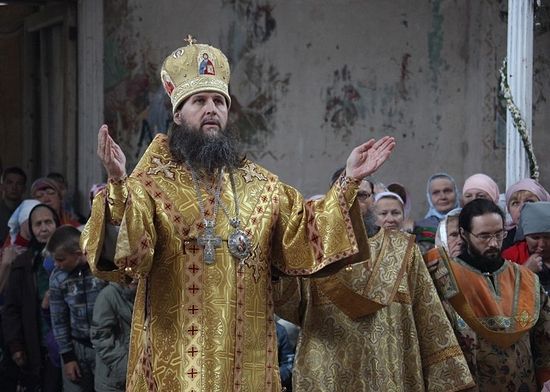 |
| Metropolitan Daniel celebrating Divine Service at the St. Nicholas Church in the village of Sura, homeland of Righteous St. John of Kronstadt. July 2012. |
— Wherever there are churches, a certain battle is going on: One man drinks while another does not; yet another man drinks but reproaches himself with his drinking. In a village with a church, people become attached to that church and life begins. Where there is no church whatsoever, utter hopelessness rules. People do not have the strength to do battle with sin. That is what I have observed across the North.
I have given this some thought. There needs to be missionary trips made by groups that include active laypeople—for local clergy cannot encompass every need. For example, a group of several people, including a clergyman and a doctor (after all, both body and soul are suffering) should go to the villages to talk with the people and help them. I think that it is both possible and necessary to do this with the help of the government. This is something that goes beyond a church project—its scale is too great, and so it should be a joint project.
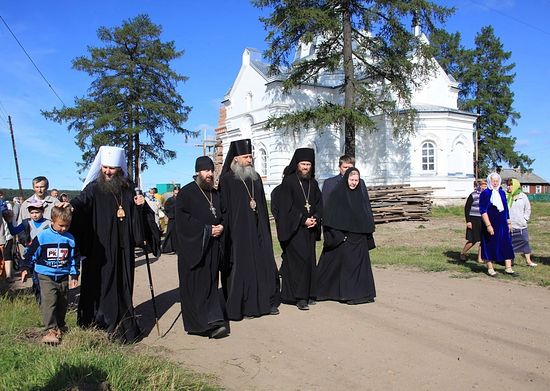 |
| During a visit by Archbishop Theognost of Sergiev-Posad to Sura and Verkola. August 2012. |
— It is a very good project. We often live next to a thing of beauty, but fail to notice it. And suddenly, people come to the village and say to its residents: “You have such a priceless pearl here! This is where your fathers, your grandfathers, your great-grandfathers prayed!” The realization begins to penetrate into them. They help restore the church, they take part in that work, and where they take part, life becomes more orderly; life becomes better.
After all, the Church has everything needed to effect the healing of a person's soul. When you are at war, you need to draw the enemy out of himself, to put him off balance. That is what is now happening. Man is losing his balance, and he can acquire peace in only one place—there is no other. “Peace be unto you!” said Christ when he appeared to his disciples.
It is that peace, given by Christ, that is capable of stopping the raging of passions. The Church was established in order to treat, to heal, to restore, and to quench those passions. They are so numerous that we are simply being torn apart—something one is often unwilling to admit to himself. He does not understand what his happening to him. Often, he is simply a plaything in the devil's hands.
If a person struggles, makes an effort, prays, and strives to be a good citizen of his native land, a good father or mother to his or her family, a friend, everything falls into place for that person. The process of setting things right does not begin with the government, but with one's own soul, with oneself, with one's family, with one's children. The main thing is to realize that fact.
When I served in Sakhalin, some remarkable people would visit the island once a year. They were physicians, including highly trained specialists—a medical strike force. How many people they saved from death! While they did not have with them all of the necessary equipment, they possessed a treasure trove of experience and good, open, hearts, and would see patients from morning to night. Based on their findings, they would explain to those they had examined: should such and such symptoms appear, drop everything and quickly go to the mainland and see a doctor.
A disease can be stopped if you turn to a specialist in time. Conversely, the disease can be allowed to get to a point when nothing will be able to help.
We observe something analogous in the spiritual life. People need to be told what is happening to them; they need a missionary strike force to be sent to them. Perhaps in the village they will not heed us the first year, or the next. By the fifth year, or the tenth, they will listen.
A person who has lived his entire life doing what he should might easily say, “I have lived my life. I can see that what I have prayed for is not according to God's will, and so I will no longer pray for it.” However, they continue to pray, to the very end.
But we want to have everything immediately. After all, we live in a consumer society where we can “learn a foreign language in only fifteen lessons.” That will not work. Everything we formerly had was shattered and destroyed over many decades. The restoration work has gone on for only twenty years.
It only takes a fraction of a second for a person to have an automobile accident. Yet it can take months, even years, to restore the body to health. We need both time and patience.

